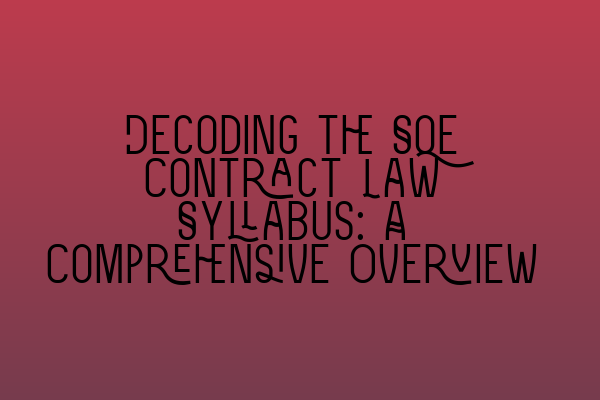Decoding the SQE Contract Law Syllabus: A Comprehensive Overview
As a solicitor, understanding contract law is essential to your practice. The Solicitors Qualifying Exam (SQE) now covers contract law extensively. In this blog post, we will provide a comprehensive overview of the SQE Contract Law syllabus to help you prepare effectively for the exam.
1. Introduction to SQE Contract Law
Before diving into the specific topics covered in the SQE Contract Law syllabus, let’s briefly discuss what the SQE is. The SQE is the new assessment for individuals wishing to qualify as solicitors in England and Wales. It replaces the previous system of qualifying as a solicitor through the Legal Practice Course (LPC) and a two-year training contract.
The SQE consists of two stages: SQE1 and SQE2. It is designed to assess the skills and knowledge necessary for competent practice as a solicitor.
2. SQE Contract Law Syllabus
The Contract Law syllabus is a significant component of the SQE1 exam. It covers various areas of contract law that solicitors frequently encounter in their practice. A solid understanding of these topics is crucial to your success in the exam and your future career.
The Contract Law syllabus includes but is not limited to:
- The formation and interpretation of contracts
- Terms and conditions
- Breach of contract
- Remedies for breach
- Discharge of contracts
- Illegal and void contracts
- Consumer contracts
- The relationship between contract and other areas of law
2.1 Formation and Interpretation of Contracts
The formation and interpretation of contracts is a fundamental topic within contract law. It involves understanding the essential elements required for a valid contract, such as offer, acceptance, consideration, and intention to create legal relations. Knowledge of the key case law and statutory provisions in this area is essential.
For additional practice in this area, you can check out our article on SQE 1 Practice Exam Questions.
2.2 Terms and Conditions
Terms and conditions determine the rights and obligations of parties in a contract. Understanding the different types of terms, implied terms, and exclusion clauses is crucial. You should also be familiar with the legal principles and tests used to interpret contractual terms.
If you want to assess your knowledge in this area, take a look at our comprehensive SQE 1 Practice Mocks FLK1 FLK2.
2.3 Breach of Contract
Breach of contract occurs when one party fails to perform their obligations under the contract. Understanding the different types of breaches, such as anticipatory breach and repudiatory breach, and the consequences they entail is crucial. You should also be familiar with the remedies available for breach of contract.
2.4 Discharge of Contracts
Knowing the various ways in which a contract can be discharged is essential. This includes discharge by performance, breach, frustration, agreement, and operation of law. Understanding the principles and case law related to discharge is vital to effectively advise clients and handle contract-related matters.
2.5 Consumer Contracts
Consumer contracts are a specific area of contract law that require specialized knowledge. Understanding the additional rights and protections available to consumers and the implications for businesses is crucial. Knowledge of the Consumer Rights Act 2015 and related legislation is necessary to navigate this area proficiently.
To further enhance your preparation, we recommend exploring our comprehensive SQE 2 Preparation Courses.
3. Tips for Success in the SQE Contract Law Exam
Preparing for the SQE Contract Law exam requires a systematic approach. Here are some tips to help you succeed:
- Create a study schedule and allocate time to each topic in the syllabus.
- Make use of practice exams and mocks to familiarize yourself with the format and assess your knowledge.
- Review key cases, statutes, and legal principles related to contract law.
- Work on developing your legal analysis and problem-solving skills through case studies and hypothetical scenarios.
- Seek guidance from experienced tutors or enroll in professional preparation courses, such as our SQE 1 Preparation Courses.
By following these tips and investing time and effort into your preparation, you can increase your chances of success in the SQE Contract Law exam.
4. Conclusion
As a solicitor, a strong foundation in contract law is essential. The SQE Contract Law syllabus covers a wide range of topics that are directly relevant to your future practice. By understanding and mastering these areas, you can not only succeed in the exam but also provide competent legal services to your clients.
If you want to stay up to date with the latest SRA SQE exam dates and announcements, make sure to check out our article on SRA SQE Exam Dates.
Good luck with your SQE Contract Law preparation!
